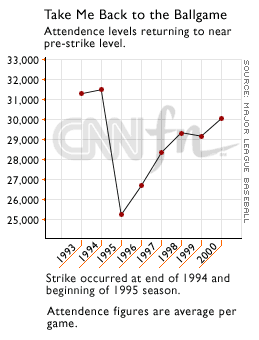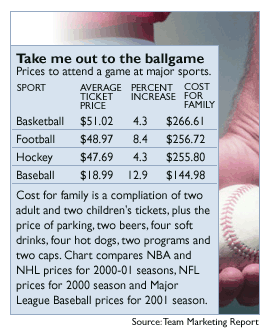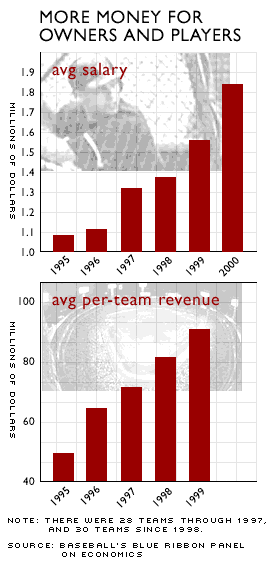|
Will baseball strike out?
|
 |
April 2, 2001: 1:31 p.m. ET
Even as revenue soars, competition and labor woes loom over opening day
By Staff Writer Chris Isidore
|
NEW YORK (CNNfn) - The start of the baseball season has always been about hope and renewal, but as the 2001 season starts this week, some inside and outside of the game worry this year could mark the beginning of the end for the national pastime as a viable business.
The expiration of a labor contract with the players looms at the end of the season. No new contract has been reached without a work stoppage in more than three decades. The last stoppage wiped out the 1994 World Series for the first time in nearly a century and seriously damaged fan support.
Many worry about the game's ability to bounce back if there is another work stoppage. Despite increased average attendance four of the last five years, 2000 attendance was still just short of pre-strike highs.
 While revenues have steadily risen in recent years, so have salaries. Average player pay reached $1.8 million last year, up two-thirds from the first year after the strike. And it's estimated the average salary will reach more than $2.2 million this year. While revenues have steadily risen in recent years, so have salaries. Average player pay reached $1.8 million last year, up two-thirds from the first year after the strike. And it's estimated the average salary will reach more than $2.2 million this year.
The off-season saw star shortstop Alex Rodriguez sign a record $252 million, 10-year contract with the Texas Rangers, a contract that not only will have him paid more than some teams' entire payroll, but exceeds the total value of most teams.
Still it was only the largest of three contracts signed in recent months that topped the $100 million level.
Those contracts are seen as indicative of a situation in which the gulf between baseball's haves and have nots has soared. And it also prompted a number of the game's top-paid stars to complain about having to get by on a low 8-figure salary, complaints that have prompted disgust from fans, sportswriters and even some players and agents.
A committee appointed by the major leagues last year found only three franchises out of the current 30 -- the New York Yankees, the Cleveland Indians and the Colorado Rockies, have made money since the end of the strike. One franchise, the Arizona Diamondbacks, turned to its star players this year to defer salary due to cash flow problems.
Click here to read CNNSI.com's baseball coverage
"Baseball's current economic system has created a caste system in which only high revenue and high payroll clubs have a realistic opportunity to reach the post-season," said former Sen. George Mitchell, one of the members of the committee, along with former Federal Reserve chairman Paul Volcker, Yale University President Richard Levin and journalist George Will.
Some owners, and Major League Baseball Commissioner Bud Selig, have begun to discuss the possibility of contraction - disbanding two or more of the least profitable teams.
Critics say that problems are overstated
But some other observers believe that baseball's problems are as overstated as the abilities of many heralded rookies at this time of year.
Baseball's own statistics show that the growth in revenue has outstripped the growth in average pay since the strike. A new $2.5 billion, six-year national television contract will increase payouts to all 30 teams. And this season brings new parks to Milwaukee and Pittsburgh, two troubled smaller markets. New stadiums are on the way to Cincinnati and San Diego, and maybe other money-losing markets.
"People tend to take sides in these discussions. They feel obligated to say baseball is in catastrophic circumstance or no problem at all," said Andrew Zimbalist, professor at Smith College, and author of Baseball and Billions, a look at the economics of the game. "I think extremes are misleading. I think there's a problem and it's of modest dimensions."
Click here for a look at baseball stocks
Zimbalist and some other economists say that the big-dollar contracts are not the onerous problems for the clubs that fans might assume. The Texas Rangers, who signed Alex Rodriguez, raised ticket prices less than 1 percent in the off season and current prices are less than $1 above league averages.
Team owner Tom Hicks, CEO of leveraged buyout firm Hicks, Muse, Tate & Furst Inc., said that increases in ticket sales and value of the team makes the contract a good deal for the franchise.
 Even the fans being asked to pay more for tickets this season are apparently willing to do so. The teams with the two largest percentage increase in average ticket prices, the smaller-market Pittsburgh Pirates and Milwaukee Brewers, have seen ticket sales soar due to the new parks. Even the fans being asked to pay more for tickets this season are apparently willing to do so. The teams with the two largest percentage increase in average ticket prices, the smaller-market Pittsburgh Pirates and Milwaukee Brewers, have seen ticket sales soar due to the new parks.
Several other teams reported record off-season sales, said Kurt Hunzeker, associate editor of Team Marketing Report, which surveys tickets and concession prices.
"Fans [are] still going to the ballpark," said Hunzeker. "The economics of baseball are such that these increases are in line with other sports leagues. And baseball is the best value going to a sports game of any league." (202KB WAV) (202KB AIFF)
There are signs that that the worst fears of many fans - another work stoppage - may be avoided this time around.
Don Fehr, executive director of the players union, has been saying that the rhetoric to early talks between the sides is better than in the past.
And anecdotal evidence suggests that perhaps players are looking to find a common ground with management this time. When Arizona asked top players to defer salary, they said yes. And several players were willing to criticize hold-outs by stars in spring training that were prompted by the new round of mega-contracts.
Zimbalist is optimistic that the game can avoid a work stoppage. But he said the first hurdle is for the large revenue and small revenue clubs to reach an agreement on revenue sharing that they've never been able to reach before.
Can everyone compete?
Gary Huckabay, founder of Baseball Prospectus, a leading baseball annual book of statistics and analysis, said the assumption that baseball is not competitive in the current format is itself faulty.
"I haven't seen the evidence there is a problem, but there is a problem in as much that perception begins to equal reality," he said.
Huckabay points out that for the first time in the game's history last year no team won more than 60 percent or its games or won less than 40 percent of its games. He estimates that with the current playoff structure that at least 14 out of 30 teams, or nearly half, have a realistic chance to win the World Series, not only five or six large market teams as critics charge.
And among the teams not included in Huckabay's 14 "contenders" are some large payroll teams, like the Baltimore Orioles, whom he said is the worst team in the majors, and other teams with great revenue streams, such as the Chicago Cubs, owned by the Tribune Co. (TRB: Research, Estimates), which broadcasts its games nationwide on its own cable station.
Owners not pushing salary cap
The blue ribbon panel rejected the idea of a "salary cap" on each team's total player payroll as a way of solving the profitability problem. Instead it calls for the sharing of local revenue, coupled with a 50 percent "tax" on team payrolls above $84 million, with the proceeds distributed to the poorer teams.
 But the committee also suggested rules or incentives to make sure that teams have a payroll of at least $40 million, to prevent the poorer teams from pocketing the proceeds of revenue sharing and to make the plan more palatable to players. But the committee also suggested rules or incentives to make sure that teams have a payroll of at least $40 million, to prevent the poorer teams from pocketing the proceeds of revenue sharing and to make the plan more palatable to players.
Still, some economists question whether even that plan would fly with the union, saying it would limit the players from getting top dollar from the richest teams.
"Players may say they're concerned about the disparity in team payrolls, but there's a difference between being concerned and being willing to accept lower salaries," said Mark Eschenfelder, associate professor of economics and finance at Robert Morris College in Pittsburgh, and another expert in sports economics.
"Voting with one's dollar can be a bit more painful than just saying things."
Huckabay argues that it would even be bad business practice for the owners to impose a "tax" on team payroll. He said that if top-dollar players, �like Alex Rodriguez, bring in the fans and revenue, it would be a mistake to limit owners' ability to offer those large contracts.
"Players are not costs, they're investments," Huckabay argues. " And I would be against a cap or a 50 percent salary tax if I was an owner, because it limits my ability to invest in my business. Sometimes making a good move means spending a lot of money."
The only thing known for sure as the season begins is that one team will be the winner and one the loser at the conclusion of every game. For the game of baseball itself to win, the large market owners, the small market owners and the players may have to find a way to reach opening day 2002 with none of them seen as the clear winner in the contest that lays ahead. 
|
|
|
|
|
 |

|

